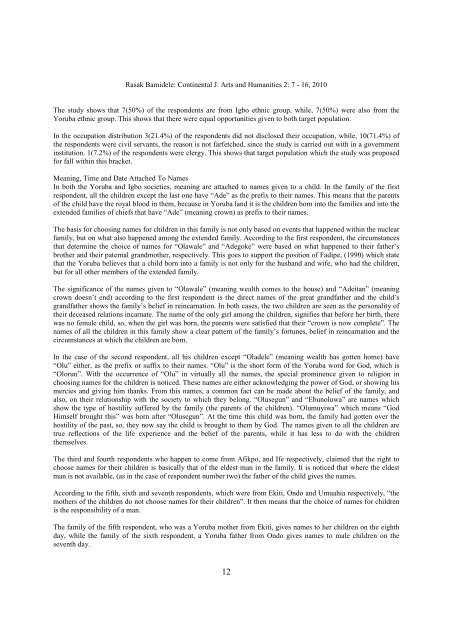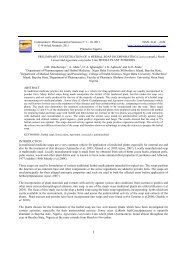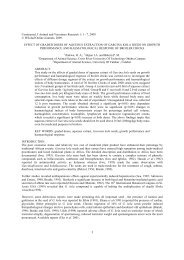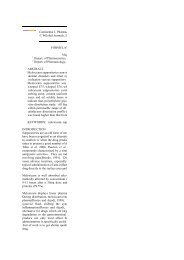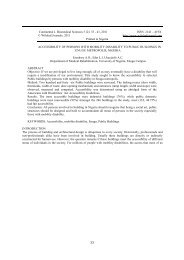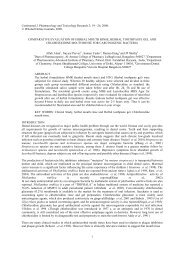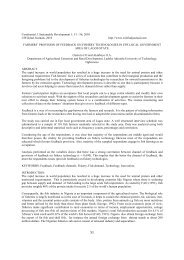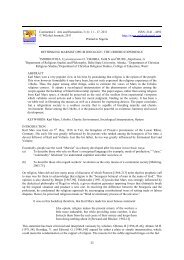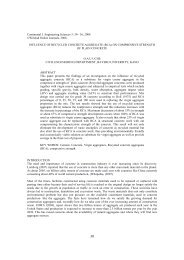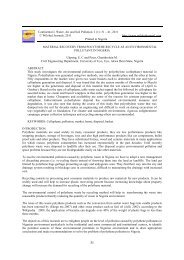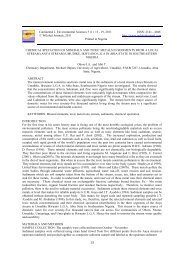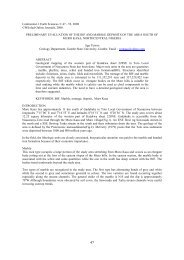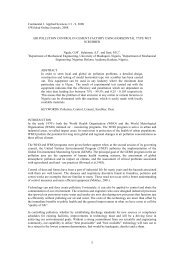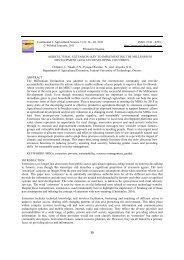Vol 2 - Arts and Humanities - Wilolud Journals
Vol 2 - Arts and Humanities - Wilolud Journals
Vol 2 - Arts and Humanities - Wilolud Journals
Create successful ePaper yourself
Turn your PDF publications into a flip-book with our unique Google optimized e-Paper software.
Rasak Bamidele: Continental J. <strong>Arts</strong> <strong>and</strong> <strong>Humanities</strong> 2: 7 - 16, 2010The study shows that 7(50%) of the respondents are from Igbo ethnic group, while, 7(50%) were also from theYoruba ethnic group. This shows that there were equal opportunities given to both target population.In the occupation distribution 3(21.4%) of the respondents did not disclosed their occupation, while, 10(71.4%) ofthe respondents were civil servants, the reason is not farfetched, since the study is carried out with in a governmentinstitution. 1(7.2%) of the respondents were clergy. This shows that target population which the study was proposedfor fall within this bracket.Meaning, Time <strong>and</strong> Date Attached To NamesIn both the Yoruba <strong>and</strong> Igbo societies, meaning are attached to names given to a child. In the family of the firstrespondent, all the children except the last one have “Ade” as the prefix to their names. This means that the parentsof the child have the royal blood in them, because in Yoruba l<strong>and</strong> it is the children born into the families <strong>and</strong> into theextended families of chiefs that have “Ade” (meaning crown) as prefix to their names.The basis for choosing names for children in this family is not only based on events that happened within the nuclearfamily, but on what also happened among the extended family. According to the first respondent, the circumstancesthat determine the choice of names for “Olawale” <strong>and</strong> “Adegoke” were based on what happened to their father’sbrother <strong>and</strong> their paternal gr<strong>and</strong>mother, respectively. This goes to support the position of Fadipe, (1990) which statethat the Yoruba believes that a child born into a family is not only for the husb<strong>and</strong> <strong>and</strong> wife, who had the children,but for all other members of the extended family.The significance of the names given to “Olawale” (meaning wealth comes to the house) <strong>and</strong> “Adeitan” (meaningcrown doesn’t end) according to the first respondent is the direct names of the great gr<strong>and</strong>father <strong>and</strong> the child’sgr<strong>and</strong>father shows the family’s belief in reincarnation. In both cases, the two children are seen as the personality oftheir deceased relations incarnate. The name of the only girl among the children, signifies that before her birth, therewas no female child, so, when the girl was born, the parents were satisfied that their “crown is now complete”. Thenames of all the children in this family show a clear pattern of the family’s fortunes, belief in reincarnation <strong>and</strong> thecircumstances at which the children are born.In the case of the second respondent, all his children except “Oladele” (meaning wealth has gotten home) have“Olu” either, as the prefix or suffix to their names. “Olu” is the short form of the Yoruba word for God, which is“Olorun”. With the occurrence of “Olu” in virtually all the names, the special prominence given to religion inchoosing names for the children is noticed. These names are either acknowledging the power of God, or showing hismercies <strong>and</strong> giving him thanks. From this names, a common fact can be made about the belief of the family, <strong>and</strong>also, on their relationship with the society to which they belong. “Olusegun” <strong>and</strong> “Ebunoluwa” are names whichshow the type of hostility suffered by the family (the parents of the children). “Olumuyiwa” which means “GodHimself brought this” was born after “Olusegun”. At the time this child was born, the family had gotten over thehostility of the past, so, they now say the child is brought to them by God. The names given to all the children aretrue reflections of the life experience <strong>and</strong> the belief of the parents, while it has less to do with the childrenthemselves.The third <strong>and</strong> fourth respondents who happen to come from Afikpo, <strong>and</strong> Ife respectively, claimed that the right tochoose names for their children is basically that of the eldest man in the family. It is noticed that where the eldestman is not available, (as in the case of respondent number two) the father of the child gives the names.According to the fifth, sixth <strong>and</strong> seventh respondents, which were from Ekiti, Ondo <strong>and</strong> Umuahia respectively, “themothers of the children do not choose names for their children”. It then means that the choice of names for childrenis the responsibility of a man.The family of the fifth respondent, who was a Yoruba mother from Ekiti, gives names to her children on the eighthday, while the family of the sixth respondent, a Yoruba father from Ondo gives names to male children on theseventh day.12


